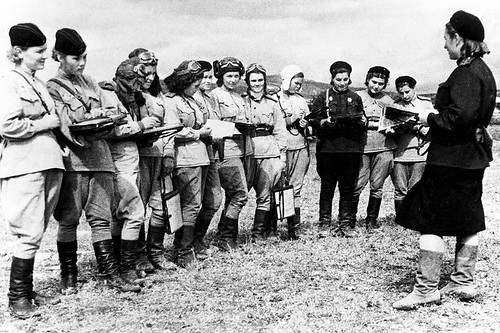
The Night Witches ready for a raid, 1944 (photo via Vanity Fair).
Welcome to Word Buzz Wednesday, in which we round up our favorite buzzworthy words of the week. The latest: badass female pilots; another strange word from Justice Scalia; and basketball players, extra-large.
featherbowling
“Featherbowling was born from that medieval family of games that endure in no small part because they can be played with a beverage in the shooter’s free hand.”
Chris Koentges, “Believe in Featherbowling,” ESPN, Jun 19, 2015
Featherbowling — or trabollen in Dutch — originated in Flanders, Belgium, and is similar to curling. ESPN describes it as bocce except instead of balls “you roll discs that have been slightly weighted to rotate unevenly across the earth, exposing the shooter’s secret divine grace.”
Night Witches
“By the end of the war, the Night Witches had flown somewhere in the vicinity of 30,000 bombing raids, delivering around 23,000 tons of munitions right to Nazi’s.”
Eric Grundhauser, “The Little-Known Story of the Night Witches, an All-Female Force in WWII,” Vanity Fair, June 25, 2015
This month marks the 73rd anniversary of the establishment of the Night Witches, a Soviet “all-female squadron of bomber pilots who ran thousands of daring bombing raids with little more than wooden planes and the cover of night.”
The squadron was started by the “Russian Amelia Earhart,” Colonel Marina Raskova, who “lobbied to finds ways for women to take a more active role in the war.” In early fall 1941, Raskova’s efforts paid off: Joseph Stalin himself ordered that she set up a trio of all-women air squads, including one team of night bombers.
To stay hidden, the pilots would kill their engines when they neared their targets, “making a light ‘whooshing’ sound.” Soon German soldiers began calling them Nachthexen, or “Night Witches,” and even thought the women had been given special pills that “gave them the night vision of a cat.”
parbunkells
“But despite the initial plea from the artist who created an online page for the word and asked others not to use it anywhere else on the Internet, ‘parbunkells,’ which means ‘coming together through the binding of two ropes,’ immediately popped up all over cyberspace.”
Ewa Kern-Jedrychowska, “‘Parbunkells’ Conquers the Internet Against Artist’s Wishes,” DNAInfo, June 26, 2015
Julia Weist, a Brooklyn artist (natch), posted this rare 17th-century word on a billboard, which made a lot of people on the internet realize they don’t know everything. Weist unearthed the word in a 1627 publication housed in the New York Public Library’s Rare Book Division.
(H/t: Mededitor)
putsch
“He called the decision a ‘judicial Putsch’ and ‘a threat to democracy’, in which the majority discovered a right to marriage that all the US legal minds before them had overlooked.”
Anthony Zurcher, “Gay marriage: It’s a ‘judicial Putsch’ warns dissenting Scalia,” BBC, June 26, 2015
A putsch is similar to a coup, or “a sudden attempt by a group to overthrow a government.” The word putsch comes from the German Putsch, “revolt, riot,” or literally, “a sudden blow, push, thrust, shock,” which is imitative in origin.
super-big
“So often, super-bigs, as players like Meng and Sing are called, get overworked. Their feet, still growing, can’t handle the stress of carrying such large bodies up and down a court. They break down.”
Les Carpenter, “Satnam Singh: an NBA history-maker, and a new type of super-big,” The Guardian, June 26, 2015
Super-big is basketball slang for an enormous player — one who’s often over seven feet tall.